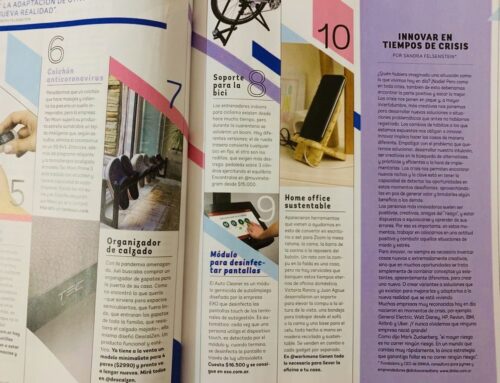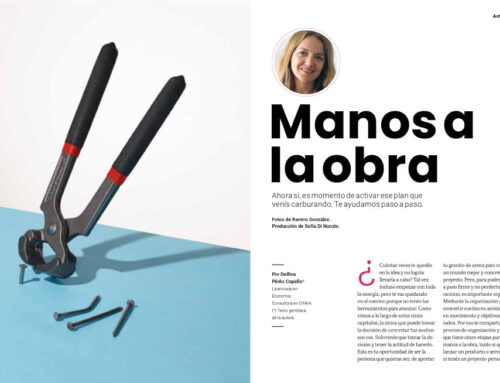We interviewed the engineer Sandra Felsenstein, director of the Dinkka consultant, specialized in advising SME entrepreneurs and entrepreneurs, and reveals the indispensable keys to turn a project into a successful business.
Lalala: What are the main steps you recommend to leave the work in a dependency relationship and put alone?
Sandra Felsenstein: Before leaving the work in a dependency relationship we have to be clear about the bases of our new venture. Analyze your viability, have a commercial plan, projections, etc. Aligned with this, we must make an economic forecast, since probably the new project does not obtain positive results immediately, so we must estimate, in addition to how much we must invest, how we will solve the periods when the results are negative (that is why it is important to have a lot of information: what will be our balance point and make an economic-financial analysis prior to the most objective possible).
Lalala: How to know if an idea is original and has commercial potential?
S. F.: The most important thing for a successful project is not necessarily originality, but its potential. The important thing is the added value that we are going to give to our proposal, and how we are going to differentiate from our competitors, if they exist. That is, the idea may not be entirely novel, it can be a product or service that exists in the market, but that we are going to offer it with a differential value that will make our proposal better. This differential can be regarding the product or service itself, in terms of distribution, post-sale service, etc. I consider that this added value, the differential, is more important than the originality of the idea. Likewise, the commercial potential is fundamental. This evaluation is carried out with a deep market evaluation and subsequently, understanding whether there is a place for my product or service, at what price, with what costs, etc.
Lalala: Is it advisable to associate with a friend or partner?
S. F.: In order for societies to succeed, I consider that certain conditions must be met among the partners: - Trust (both in the literal sense of the word and in relation to the work capacity of the other) - Complementary profiles - Energy work couple - similar needs - roles and functions well delimited and defined when associating with a couple or friend always runs the risk that a problem at the workplace alters the personal relationship, but there are cases where this type of societies works. What I consider fundamental is that if it is decided to associate, this decision is because these conditions are really met and not for thoughts like “it is my friend, I want to work with him/she spent more time together” or “I feel alone, I would like to share this with someone”, “it is my partner/friend and have no job, if I associate it, I give it a hand”, etc.
As for the previous points:
- Trust: It refers both in the literal sense of the word and in relation to the work capacity of the other, that is, I trust him or her in that the work that touches her will solve it efficiently.
- Complementary profiles: if I am creative for example, that my partner has a commercial administrative profile; If I am a technician, that my partner is more creative, etc.
- Energy work couple: that we both dedicate the same time load, work intensity, energy, etc. Otherwise, this must be scheduled beforehand and reflected in different salaries for example or participation of the company.
- Similar needs: in terms of project expectations. Is it a hobby? I want to live on this? How long do each one need to start seeing economic results? Do I need this to live? I have capital to invest? If the answers are not similar for both partners, a future shock will surely occur.
- Well -defined roles and functions: this is fundamental, especially for societies between friends or couples. To avoid friction, discussions and fights, it is very important that each one has their role and function within the well -defined company and as I mentioned earlier, that the other trusts the performance of their pair in this aspect.
Lalala: What are the pros of being our "own boss"?
S. F.: The pros are: managing our time, making decisions for ourselves, generally implies much greater motivation, choosing the course and above all, when one has a passion for his project, feeling that he is giving everything for him.
Lalala: What are the cons of entrepreneurs?
S. F.: To be a successful entrepreneur, it is essential to have a lot of thrust, conviction for what you want to achieve, enthusiasm, self-motivation, behavior for work. If any of this is missing, the entrepreneurship is not successful. On the other hand, we must be able to deal with uncertainty, know that there are "better moments and worse moments", and not have the security of having a salary at the end of the month. On the other hand, a good boss (leader) meets the motivator mission. In the case of his own venture, the entrepreneur is the one who must motivate his work team. Motivating others without someone who motivates us, is an important challenge that a good entrepreneur must learn.
Link: https://lalalanews.com.ar/lifestyle/-sumate-a-la-ola-emprendedora-_n395








